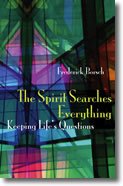An
Interview with
Frederick Borsch
author of The
Spirit Searches Everything: Keeping Life’s Questions
Read an excerpt

In the preface to his new book, author, professor, and former bishop Frederick Borsch lists two paragraphs of questions such as: What is the universe made of? Can our lives be said to have meaning? How can we best live together? These aren’t what you’d call “making conversation.” His queries set the tone for a deep exploration of some
of humanity’s most compelling questions about our existence and the nature of God.
Borsch is a good guide for this mental and spiritual expedition, for the route he takes leads right past his own dwelling. His explanations are intertwined with personal accounts that take abstract ideas and relate them to his own experience. Explorefaith asked him about the writing of this book, and why the questions of life are so important, even if we feel far from the answer.
Your
book honors the significance of questions. What can we learn about
ourselves by asking the questions that can sometimes leave us unsettled?
I tell the story in the book about meeting with a group of university students. We called our group the Interfaith Council and found ourselves asking lots of questions about life and about each other's religions: What might human life be about? How is it we can think about ourselves thinking? What kind of a universe do we live in? Does life have any lasting significance? What would we call a good life? Is there a Spirit of all life? Why all the suffering and evil? What happens at death?
We laughed and called our meetings "Big Questions." But we decided such questions were at the heart of our lives. More than homo sapiens, humans knowing, we were homo quaerens, humans asking.
Sometimes religion gives us answers that we find hard to
accept. If we are unable to believe what we are taught, does
that indicate a lack of faith?
For me vital religious faith isn't so much about  answers. It's more like facing in the direction of answers. When one stops to think about it, that in many ways is what the Bible is all about. It's not so much an answer book as a storybook. The stories help direct us toward the ways of God with questions like "Why was the world created?" and "Why did Jesus die?" answers. It's more like facing in the direction of answers. When one stops to think about it, that in many ways is what the Bible is all about. It's not so much an answer book as a storybook. The stories help direct us toward the ways of God with questions like "Why was the world created?" and "Why did Jesus die?"
Jesus tells lots of stories too. People ask him questions or he provokes questions like "Who is my neighbor?" and "What must I do to inherit eternal life?" (and we ask, "What would 'eternal life' be?"). Jesus responds with a story: "A man was going down the road from Jerusalem to Jericho . . . ."
Or the writer of the Psalms asks God, "Why are you hiding yourself in the time of trouble?" And, hauntingly, Jesus cries out, "My God, my God, why have you forsaken me?"
Then there are so many of our questions. One terrifying night I was on a plane that crashed. "Where is God when the plane crashes?" The Interfaith Council had to cry out to God when one of its members was killed.
Keeping
Life’s Questions is the sub-title of the book. Keeping
life's questions - holding on to them faithfully is, I would maintain,
a way of prayer and faithful living. It is the Psalmist who also
prays, "O God, you are my God, eagerly I seek you."
Poetry, both your own and that written by others, appears
throughout your book, not least when you talk about how we might
best think about suffering. What is it about poetry that speaks
to subjects we find hard to comprehend?
Many poets, too, are keepers of life's questions.
They are explorers. They are aware that even the questions can sometimes
be hard to put into words. So they explore experience with their
words and images. Songs can do that too. Think of Bob Dylan singing
"In this age of fiberglass I'm looking for a gem." What
would that gem be?
You look to science for many theories and ideas. For some people,
scientific explanations of the universe and our humanity detract
from the idea of an all-powerful creator God. How do you reconcile
the two?
I don't try to reconcile belief and science,
but in the book I do try to think of them together—to hold
both in mind as aspects of the world we live in. I tell the story
about living in Princeton when I was Dean of the Chapel at the University.
Our home was across the street from the Astrophysics Department.
Wow!
Has writing the book helped you with your own
questions about faith?
It has. It might sound strange to some but I regard
the book as kind of "evangelical." I know there
are lots of other people like me asking life's big questions. I
believe that keeping them is a way of discovering -- not
answers, but a relationship with the Awareness of all life- - a
relationship of our own questing spirit-awareness with (as we hear
in 2 Corinthians 2:12) "The Spirit [that] Searches Everything."
Read an excerpt from The Spirit Searches Everything
Copyright ©2005 explorefaith.org

To purchase a copy of THE SPIRIT SEARCHES EVERYTHING, visit
Cowley
Publications. This link
is provided as a service to explorefaith.org visitors and registered
users.
|




